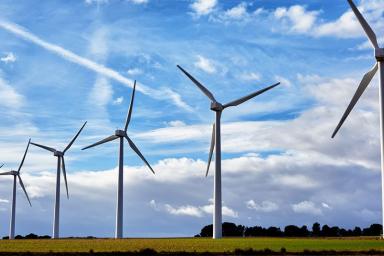How to get your electricity from renewable sources
As a business, cutting your energy consumption is crucial in helping to reduce your contribution to greenhouse gas emissions and global warming.
One way to do this is to switch to green tariffs, electricity tariffs that are generated by renewable sources such as solar panels or wind turbines.
This can help to reduce your carbon footprint and make your business more environmentally friendly.
Green tariffs
A green tariff is a type of energy plan that enables businesses to reduce their energy consumption.
The tariff works by ‘matching’ the energy that a business purchases with renewable energy bought on their behalf by an energy supplier.
This helps to encourage businesses to switch to cleaner energy sources (like solar, wind, and hydroelectric) and reduces the overall demand for energy generated from fossil fuels.
Over half of all new electricity tariffs launched are now labelled as ‘green’ or ‘100% renewable’.
A green tariff can be a great way to set your business apart from others in terms of sustainability.
Purchasing green tariffs on top of methods to reduce energy consumption can also help your business to save money.
Not only do you benefit from reduced costs, but you can also gain a competitive edge from improving your energy consumption.
When considering green tariffs, it is important to choose the option that best suits your needs.
The greenest tariffs are those where your supplier buys renewable 'green' electricity and has the corresponding certificates directly from the generators.
This ensures that you are getting your energy from a sustainable and secure source.
GEUK, Ecotricity, and Good Energy are all companies that operate in this way and are transparent about where their electricity comes from.
Different types of Green tariff
When it comes to choosing an electricity supplier, it's important to be aware of the different types of green tariffs available.
It’s worth remembering that not all green tariffs are 100% renewable energy.
Some tariff suppliers are backed by the Renewable Energy Guarantees of Origin (REGO) scheme, this provides transparency to consumers about the proportion of electricity that suppliers source from renewable generation.
The certificate shows what percentage of the energy generated came from renewable sources and how much came from so-called brown energy sources.
Brown energy sources (also known as brown power) are fossil fuels such as coal, gas, and oil.
A green tariff from a mixed-source supplier may divert some potentially 'dirtier' energy towards your business so it's important to remember that these tariffs don't necessarily lead to increased support for renewable generation.
Another issue is ‘greenwashing’.
Some companies claim to supply 100% renewable energy by simply buying excess REGO certificates to offset any energy generated by fossil fuels.
These cheaply available certificates are available at times of excess production across the European Union, which means that little is done to encourage the generation of renewable energy in the UK.
If you're interested in supporting renewable generation, speak to your supplier to ensure their tariff is 100% renewable.
This way, you can be sure that your business is supporting the growth of renewable energy.
Other ways your business can go green
You could also implement ISO 50001:2018 as an energy management standard, ensuring that your business is compliant with the Energy Saving Opportunity Scheme, further improving your energy efficiency.
All of this leads to tangible ways to reduce your company's carbon footprint and promote sustainable practices.
With the cost of energy soaring for businesses across the country, being green is not only good for the planet – it can also make good business sense.
Changing the source of your energy is a big step in becoming net zero but don’t forget the small steps too.
Other ways to reduce your energy consumption include swapping to energy-saving LED light bulbs and switching off appliances rather than leaving them on standby.
By looking at how you use your energy as well as where it comes from, your business can make a big difference in the fight against climate change.
Disclaimer: We make reasonable efforts to keep the content of this article up to date, but we do not guarantee or warrant (implied or otherwise) that it is current, accurate or complete. This article is intended for general information purposes only and does not constitute advice of any kind, including legal, financial, tax, or other professional advice. You should always seek professional or specialist advice or support before doing anything on the basis of the content of this article.
Neither British Business Bank plc nor any of its subsidiaries are liable for any loss or damage (foreseeable or not) that may come from relying on this article, whether as result of our negligence, breach of contract or otherwise. “Loss” includes (but is not limited to) any direct, indirect, or consequential loss, loss of income, revenue, benefits, profits, opportunity, anticipated savings, or data. We do not exclude liability for any liability which cannot be excluded or limited under English law.
Tags related to content:
Green Decoder
Featuring a glossary of sustainable terms curated in partnership with the Nottingham Business School, Nottingham Trent University, our green decoder is helping smaller businesses decipher the terminology surrounding decarbonisation.



